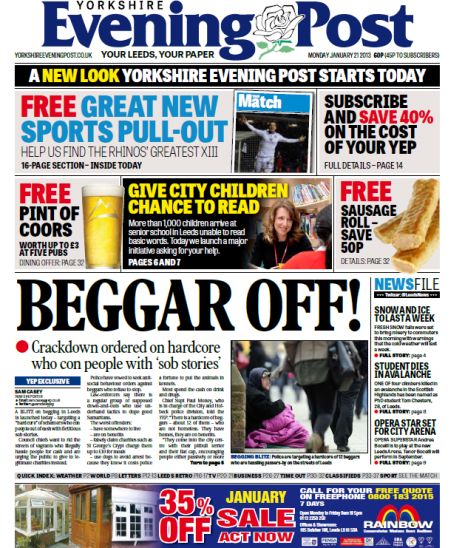By Eric King-
An error made by a newspaper that published the pictures of under aged children without appropriate consent has highlighted the need for greater awareness among journalists of all journalistic codes of conduct embedded in Ipso’s comprehensive rules.
The Yorkshire Evening Post has been rapped by press regulator Ipso for publishing the images of the children of a mother who died from cancer. Ipso said the paper breached the Editors’ Code of Practice by publishing photos of of a mother and her children following the woman’s death, despite the consent of the woman’s partner.
The Independent Press Standards Organisation ruled that the article published on the newspaper’s front page, and published in full on page three and online on 9 March, breached Clause 6 (children) of the code. Error committed by the paper in this instance is forgivable because the publication was contacted by the grandmother of the diseased requesting coverage of a fundraising event being organised in memory of a local woman who had recently died of cancer.
Unfortunately, the fact the media outlet was approached by the grandmother does not justify the publication of children’s photos without the consultation of those with parental responsibility. On the face of it, the publication of the story appeared harmless because of the fundraising objective. Where the paper failed was to foresee the potential privacy of the woman’s death as far as the disclosure of the children’s identity.
Two un-pixelated photos of the woman and her two children accompanied the article was said to have left the natural father of the children distressed one showing them together in a swimming pool and the other with the kids in fancy dress. Their first names and ages were also included. He complained that his children had been approached by their friends in school who inquired for more details about the family tragedy.
APOLOGY
The Yorkshire Evening Post, which is owned by JPI Media, apologised for any distress caused but said it had been contacted by the children’s grandmother to raise awareness of the fundraising event.
The paper said its journalist had asked whether she could provide any photos of the children, and she had directed them to her late daughter’s partner, not the father of the children, who provided the images. The newspaper told IPSO the photos were “published in good faith with the intention of helping raise awareness of the fundraising effort”.
It added that modern families are “complicated” and it had “no reason to believe that the person who provided the photographs was not in a position to consent to their publication”, according to the IPSO ruling. The Evening Post added that the photos were not on an issue relating to the children’s welfare and that neither the images nor the article revealed anything private about them. However, the revelation of their mother’s death to cancer was private enough to them, one the paper failed to consider
The press regulator said in its ruling that although the paper had intended to publish a positive article to raise awareness of the woman’s illness and the fundraising efforts, it was still required to take Clause 6 (children) of the code into account.
Regulator Ipso made reference to their clause which states that children under 16 “must not be interviewed or photographed on issues involving their own or another child’s welfare unless a custodial parent or similarly responsible adult consents”.
Accordingly, neither the grandmother nor her daughter’s partner were able to give the consent of a custodial parent, IPSO said.
“The article was about the death of the children’s mother, which was an issue which related to their welfare,” the regulator added.
“The committee acknowledged that it may not always be possible to know who has parental responsibility for a child, and that the reporter had been acting in good faith in assuming that the people who provided the photographs were in a position to consent to their publication.
“However, the reporter had made no enquiries as to whether either of those adults had parental responsibility for the children.”

